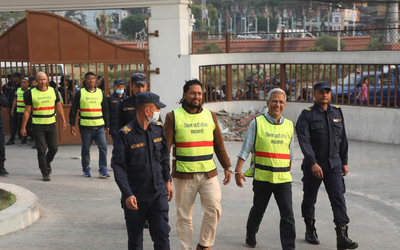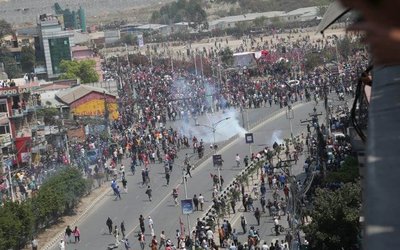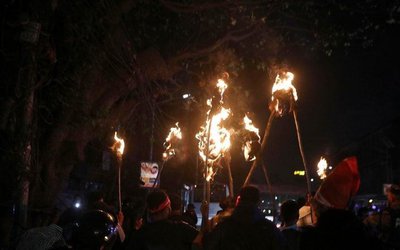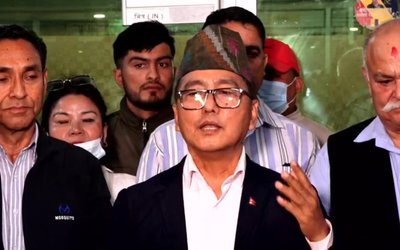
The Hindus leaving in different parts of Nepal observed the festival of Nag Panchami by pasting the pictures of the Nag, or the serpent deity, above the main entrance gate of their houses on Thrusday.
People visited Nagdaha at Dhapakhrel,Nag Pokhari pond in Kathmandu and Taudaha. People also visited the nearby temples dedicated to snakes and worshiped the serpent deity.
Nag Panchami is celebrated on the fifth day of the moonlit-fortnight in the month of Saun (between July and August). This is the time when serpents come out of their holes that get inundated with rainwater for a drier shelter. As such, they pose a danger to man.
The festival that falls in the rainy season is believed to counter the increased possibility of a snake bite during this time.
Likewise, a big fare was held at Changunarayan Temple, which lies atop a hillcok in Bhaktapur. A large crowd of devotees also visited the temple.
According to Hindu religion, there is a tradition of pasting the images of Nag at the main gate after worshipping Lord Changunarayan.
Similarly, a special puja preformed by Bhatta at Basuki Nag Temple at Pashupati amidst the playing of cymbals. It is believed that Basuki Nag remain awake whole day by such activities.
The Nag that has been kept at the neck of Red Machhindranath was also worshipped.
Significance of Nag Panchami 2018
Hindu mythology is filled with anecdotes involving snakes. They are said to be the resident of Nag Loka. On Nag Panchami, they are worshiped for the protection of the family from evil energies. Nag Panchami is one of the oldest festivals of the country, and has several myths, folklores and legends associated with it. Lord Krishna (an avatar of Lord Vishnu) and Kalia had an epic battle and Kalia was defeated by Lord Krishna. Kalia is forced to take back all the poison from the river, and in return, Lord Krishna blessed him saying whosoever will offer milk and prayers to the snakes on this day (Nag Panchami), would be relieved of all his troubles and sins NDTV reports.
A wider known legend is tied to the great 'samudra-manthan' episode. According to scriptures, during samudra-manthan, the milk-ocean was churned, where all kinds of magical herbs and potions produced that were to be divided between devas and asuras. However, churning the ocean also threw a pot of deadly poison, which had the power to wipe out entire creation. Lord Shiva drank all the poison that came out from the churning. A few drops fell on the ground as well, which were drunk by Shiva's closest aides - snakes. To soothe the effect of poison, the devtas performed Ganga Abhishek on Lord Shiva and the snakes. Experts say that the act of offering milk to the snakes is perhaps somewhere tied to this episode.
The act of offering milk to the snakes is perhaps somewhere tied to the Samudra Manthan episode.
Then, there is this legend that goes back to the times of Mahabharata and the epic story of Astika. He was the Brahmin son of Jaratkarus, who stopped the sarpa satra yagna (fire sacrifice) of Janamejaya, ruler of the Kuru Empire, which lasted for 12 years. This yagna was performed by Janamejaya to end the race of all snakes to avenge for the death of his father Parikshita, who died due to snake bite of Takshaka, the king of snakes. The day that Astika stopped the yagna was on the shukla paksha panchami day in the month of Shravan. Takshaka, the king of snakes, and his remaining race at that time were saved from decimation by the sarpa satra yagna due to this intervention. Since that day, the festival is observed as Naga Panchami.
- India Supported Construction Of Four Schools In Nuwakot
- Mar 19, 2021
- Nepal Denies Permission For Third Phase Trial Of Vaccine Against COVID-19
- Aug 31, 2020
- Messi Can Only Cancel Barcelona Contract If €700 Million Release Clause Is Paid, La Liga Confirms
- Aug 31, 2020
- India To Carry Out Study On Kathmandu-Raksaul Railway
- Aug 28, 2020
- COVID-19: 1,351 Personal Of Nepal Police Infected
- Aug 28, 2020















